 WORD SEARCH: Can you solve Allan Rae's classical music word search puzzles? We're currently publishing one per month.
WORD SEARCH: Can you solve Allan Rae's classical music word search puzzles? We're currently publishing one per month.
 DISCUSSION: John Dante Prevedini leads a discussion about Improvisation in the classical world and beyond, including contributions from David Arditti, James Lewitzke, James Ross and Steve Vasta.
DISCUSSION: John Dante Prevedini leads a discussion about Improvisation in the classical world and beyond, including contributions from David Arditti, James Lewitzke, James Ross and Steve Vasta.
- Malcolm Arnold
- Kenneth Bowen
- Benjamin Lees
- Władysław Słowiński
- Charles Parry
- Sarah Connolly
- D F E Auber
- Satie: Gnossiennes
Gwydion Brooke
English bassoonist Gwydion Brooke was born at Kentford in Suffolk on 16 February 1912. His real name was Frederick James Gwydion Holbrooke, and he was the son of composer Josef Holbrooke. He won a scholarship to the Royal Academy of Music in 1928, and then became second bassoonist to John Alexandra in Beecham's London Philharmonic, moving on after two years to his first job as principal, with the BBC Scottish. Following artillery and tank service in the war, 'Gwyd' joined the Liverpool Philharmonic, and then returned to London to play in Beecham's Royal Philharmonic (1946-1961), as a member of the famous wind section known as the 'Royal Family'. (The other members were Gerald Jackson, Terence MacDonagh and Jack Brymer.)
After Beecham's death, Brooke was principal bassoon in the Philharmonia Orchestra until his playing career came to an abrupt end in 1979 when he lost his bassoon. (The official story was that it had been stolen during a burglary.) He leaves a small but highly valued legacy of recordings as a soloist. In retirement he organised the editing, recording and promotion of his father's music, was a trustee of the Beecham Trust, and repaired and restored cars.
Music & Vision's Bill Newman met Gwyd in 2002. Brooke died in Bury St Edmonds, UK on 27 March 2005, aged ninety-three.
A selection of articles about Gwydion Brooke
Record box. Golden tone - Keith Bramich listens to the bassoon virtuoso Gwydion Brooke
Episodes from a memory bank - Gwydion Brooke. Bill Newman looks back at undeservedly neglected musicians.

